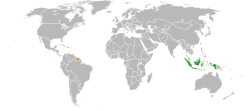 | |
Indonesia | Suriname |
|---|---|
Indonesia and Suriname established diplomatic relations on 24 January 1976. [1] Both had a special relationship, [2] based upon shared common history as former colonies of the Dutch Empire. Large numbers of Javanese migrated to Suriname to work on plantations during the late 19th and early 20th-centuries. Indonesia has an embassy in Paramaribo also accredited to the Co-operative Republic of Guyana, while Suriname has an embassy in Jakarta. Indonesia and Suriname are members of the World Trade Organization (WTO) and Forum of East Asia-Latin America Cooperation.

